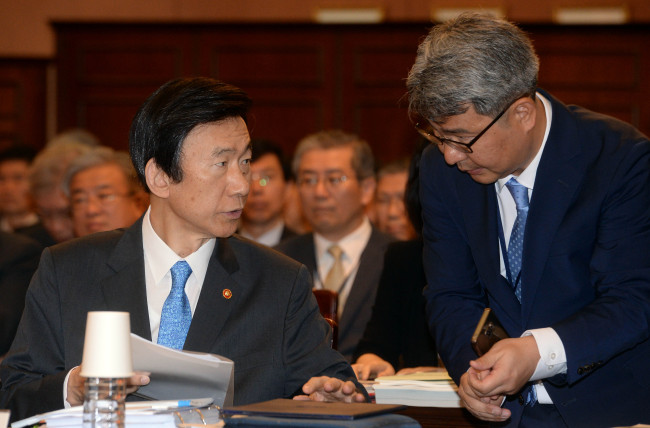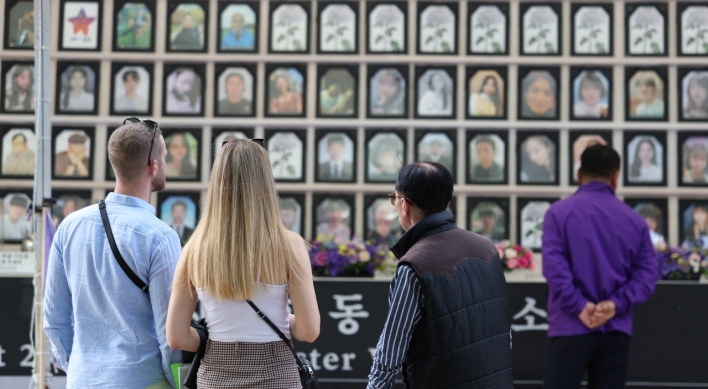Controversial nonprofit fund allegedly active before launch
By Shin Hyon-heePublished : Sept. 26, 2016 - 18:29
Fresh allegations surfaced Monday about a nonprofit fund that is at the core of an influence-peddling scandal involving close confidants of President Park Geun-hye, claiming that the organization was orchestrating an overseas aid program even before its formal launch.
During a regular parliamentary audit, Rep. Kim Kyung-hyup of the main opposition The Minjoo Party of Korea argued that the Mir Foundation requested some professors of an academic-industrial team at Ewha Womans University last November to craft rice processing strategies and sample products to be provided to developing countries.
During a regular parliamentary audit, Rep. Kim Kyung-hyup of the main opposition The Minjoo Party of Korea argued that the Mir Foundation requested some professors of an academic-industrial team at Ewha Womans University last November to craft rice processing strategies and sample products to be provided to developing countries.

Kim said this was apparently in preparation for the Korea Aid project introduced during Park’s tour in March to Ethiopia, Uganda and Kenya, which seeks to blend humanitarian assistance and the spread of Korean cuisine and other cultural elements by mobilizing mobile clinics and food trucks.
The Seoul-based foundation has come under public scrutiny after being found to have opened last October through funds donated by major conglomerates such as Samsung, Hyundai Motor, LG and SK.
Choi Sun-sil, the daughter of a late pastor who was close to Park, and Ahn Chong-bum, the president’s top secretary on policy coordination, are suspected of using their influence to amass 48.6 billion won ($44 million) for the fund and another 28.8 billion won for a separate sports nonprofit -- within a year.
In January, the Ministry of Agriculture, Food and Rural Affairs indeed clinched a service contract with the Ewha research team for the test rice products. Under the K-Meal program, a food processor linked with the university has supplied some 46,000 packages of rice powder and crackers to the African countries during and since the presidential trip.
“An intra-agency task force team on the Korea Aid program only held its very first meeting on Jan. 20, and those from the Mir Foundation were also present,” Kim said during the session.
“That means the foundation was the one who designed the program and steered the government into the official kickoff. How is this possible? The agencies were played by a private organization connected to the president’s close friend and senior secretary.”
Speculation had in recent months spiraled around the diplomatic and academic circles over the rationale behind the sudden growth in the foundation’s say in aid policy.
The Korea Aid project, which was initially supposed to be a one-off or short-term initiative timed for Park’s visit, was unexpectedly scaled up seemingly under pressure from the presidential office, according to sources. Yet relief groups and other critics were quick to lambast the program, saying it fails to meet the poor nations’ urgent livelihood needs and lacks sustainability in light of international standards.
Foreign Minister Yun Byung-se countered the criticism, lauding the project as “differentiated and innovative” and saying many other countries have requested similar assistance.
“This is an evolving process so we could always tailor-make it according to the recipient countries’ demands and realistic aspects, making adjustments at some point if necessary,” he told the lawmakers.
Kim In-shik, president of the Korea International Cooperation Agency, the program’s chief on-site implementer, said his organization only took the rice supplies program over from the Agriculture Ministry in June.
By Shin Hyon-hee (heeshin@heraldcorp.com)







![[Music in drama] Rekindle a love that slipped through your fingers](http://res.heraldm.com/phpwas/restmb_idxmake.php?idx=644&simg=/content/image/2024/05/01/20240501050484_0.jpg&u=20240501151646)



![[New faces of Assembly] Architect behind ‘audacious initiative’ believes in denuclearized North Korea](http://res.heraldm.com/phpwas/restmb_idxmake.php?idx=644&simg=/content/image/2024/05/01/20240501050627_0.jpg&u=20240502093000)






